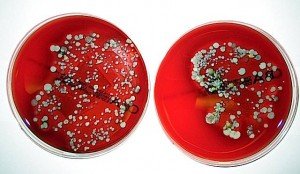 A gene that confers resistance to nearly all existing antibiotics has been found in bacteria in India, Pakistan and the UK, and appears to be spreading internationally as patients travel abroad to seek elective surgery, according to a study† published today in the journal Lancet Infectious Diseases.
A gene that confers resistance to nearly all existing antibiotics has been found in bacteria in India, Pakistan and the UK, and appears to be spreading internationally as patients travel abroad to seek elective surgery, according to a study† published today in the journal Lancet Infectious Diseases.
The authors of the study say that the spread of the NDM-1 drug resistance gene is potentially a serious global public health problem. This is because bacteria with the gene are resistant to the class of antibiotics (known as carbapenems) reserved for emergency use against superbugs, and there are few new antibiotics in development that are likely to be effective against this type of resistance. They warn that the world may be entering a new era where antibiotics can no longer be relied upon to treat infections.
The research also suggests that NDM-1 positive bacteria have already become widespread in the environment in two of the communities sampled in India. With patients in Europe, the Americas, and Australasia increasingly opting to travel abroad for elective surgery (including cosmetic surgery), the researchers warn that the superbug may spread further quickly, and that concerted international surveillance efforts are required.
†“Emergence of a new antibiotic resistance mechanism in India, Pakistan, and the UK: a molecular, biological, and epidemiological study’, Walsh et al
Prof John Fraser, Head of School of Medicine, University of Auckland, comments:
“This is a significant finding that signals the development of a highly resistant gram negative organism that is essentially resistant to most known antibiotics, including the carbapenems used as a last resort for other antibiotic resistant strains. Particularly worrying is the implication by the authors that this strain has arisen and spread extremely rapidly across India and Pakistan and also in the UK, through the wide use of un-prescribed antibiotics which offers a strong selection for this organism. Equally worrying is how easily it has spread to the UK, which has a very large number of Pakistan and India immigrants.”
The following comments were gathered by our colleagues at the UK Science Media Centre.
Professor Kevin G Kerr, Consultant Microbiologist/Hon Clinical Professor of Microbiology, Harrogate District Hospital, said:
“This investigation highlights the size of the challenge we face in dealing with a new type of resistance in bacteria such as E. coli which are common causes of infection both in hospitals and in the community. The number of antibiotics we have left to treat these superbugs is rapidly diminishing and it is conceivable that we will soon see infections which are effectively untreatable. This report shows that the battle to control the emergence of antibiotic resistant superbugs through appropriate use of antibiotics must be fought at an international level.”
Professor Christopher Thomas, Professor of Molecular Genetics, University of Birmingham, said:
“This research illustrates the relentless evolution and spread of antibiotic resistance genes in bacteria which inevitably follows the development and use of new antibiotics in both clinical and community contexts. The rise of infections (eg urinary tract infections) by bacteria that normally are found in the gut (enteric bacteria) but can create severe problems in the old, infirm or those with weakened defences is partly a side product of advances elsewhere in medicine.
“It illustrates the importance of considering health issues as a world issue – how antibiotics are prescribed and controlled in one part of the world can very rapidly have consequences elsewhere. Understanding the medical, social and environmental factors that drive this evolution and spread should be a major priority to underpin the development of policies to minimise the threat.”
Professor Richard James, Director of the Centre for Healthcare Associated Infections, University of Nottingham, said:
“This work highlights that C.difficile and MRSA are not the only bacteria that can cause us serious harm. Bacteria that produce extended spectrum beta-lactamases (ESBLs) are resistant to the majority of antibiotics, with the possible exception of the carbapenems; this results in an increased therapeutic use of this class of antibiotics.
“This research describes the detection of the recently described NDM-1 ESBL in bacterial isolates obtained from patients in a number of locations in India and the UK. NDM-1 is the third type of carbapenemase, an ESBL that encodes resistance to carbapenems, that has been identified. NDM-1 was first detected in the UK in 2008 and has already become the predominant carbapenemase. At least 17 of the 29 UK patients infected by an NDM-1 producing bacteria had a history of travel to India. There is evidence of a link to the growing practice of medical tourism.
“The NDM-1 strains in the UK were largely unrelated to each other indicating that this ESBL resistance gene is capable of dissemination to a variety of pathogenic bacteria and thus constitutes a serious threat to healthcare systems. The detection of NDM-1 in the UK resulted in the release of a National Resistance Alert 3 notice by the Department of Health in 2009.”